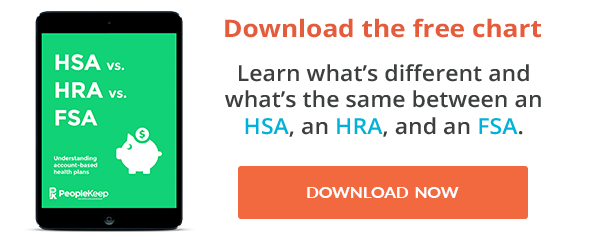Which is better: A Health Reimbursement Arrangement (HRA) or a health savings account  (HSA)? The answer depends on what you are trying to accomplish and if you are an employer or employee
(HSA)? The answer depends on what you are trying to accomplish and if you are an employer or employee
Note :. The health reforms have limited the scope of independent health reimbursement arrangements, ensuring that they can generally be used by companies with a participant on their HRA plan. To learn more about how HRAs can be used today, take a look at this article. The following blog compares the benefits of 1 person autonomous HRA an HSA
HRA vs HSA -.? What is a Health Reimbursement Arrangement (HRA)
Health Reimbursement Arrangement, or HRA, is theoretical account that employers use to pay health expenses employees. The funds do not accumulate in a separate account; Instead, employers pay only after their employees incur expenses.
vs HRA HSA - What is a Health Savings Account (HSA)?
A health savings account or HSA, is a financial account maintained by an individual to pay for qualified medical expenses. HSA must be linked to an insurance plan high-deductible health skilled, and everyone can contribute
HRA HSA vs -. Which to choose for your business?
Several features make greater HRAs for small employers, while benefiting employees. HSA generally benefit employees, but are more expensive for employers. Here are the main similarities and differences you need to remember:
vs HRA HSA - Similarities
Employer contributions to both HRA and HSA are tax deductible . Employees are not taxed on those contributions: Employer contributions HRA are excluded from wages, while deduct HSA contributions employees on their personal tax returns
Both CRH and HSA encourage employee "consumerism". helping to pay attention to health care costs and utilization of health care with more caution. They are rewarded by having unused funds roll forward each year.
Generally, CRH are better for employers while very beneficial for employees. To make the right decision, however, you need to understand the main differences between HRA and HSA.

HRA vs HSA - Significant Differences
The differences between HRA and HSA concern control, flexibility and simplicity.
1. Control. Employers have more control over costs with CRH. Only employers can contribute to CRH and use these funds to pay the real cost; with HSA contributions are paid whether or not the expenses are incurred. Employers also have more freedom to choose the expenses covered by CRH. Employees lose unused HRA funds when changing jobs, but keep all unused HSA employer contributions.
2. Flexibility. With HRA, employers can adjust the contributions by employee category (eg, management, computers, office). CRH can be used with any type of health insurance or not. In addition, CRH are easier to use in conjunction with other benefits such as cafeteria plans and ASF.
3. Simplicity. CRH are easier to understand, administer and manage. Employees do not need to store receipts for several years, worry about tax deductions or pay a monthly administration fee to their bank or broker.
| Health arrangement Repayment (HRA) | health savings account (HSA) |
| Control | |
| employers pay when expenditure is incurred, and only to the extent of contributions | Employer shall pay the full amount at the beginning of the year, whether the expenses are incurred. |
| Fund remain with the employer when the employee leaves the company. | Fund go with the employee when he / she leaves the company. |
| Only employers can contribute. | Employers, employees or third parties may contribute. |
| Flexibility | |
| Employer chooses maximum contribution. | IRS determines the maximum contribution. |
| No restrictions on health insurance. | Must be paired with high-deductible plan qualified |
| Contributions vary by type of employee. | All employees receive the same employer contribution. |
| Can be used with the FSA with some restrictions. | Can be used only with restricted, limited to use FSA. |
| Simplicity | |
| the funds paid into the bank account of the company. | employee sets up account with the bank or brokerage and separate policy with the insurance company. |
| employee submits receipts for payment. | manages employee account and submit expenses for payment. |
| Rules driven by the broad guidelines of the IRS and the design of the business plan. | [1945038règlements] IRS complex governing expenditures, financing, participation, and fiduciary requirements. |
the best-in-class software platforms hra offer the ability to create and manage separate employees course choose what expenses cover you control how you'll pay and accommodate plans and different health carriers. It allows you to create electronic map document and communicate your new plan. It also ensures your plan will be fully compatible with all regulations.
CRH are easier to understand, administer and manage. Employees do not need to store receipts for several years, worry about tax deductions or pay a monthly administration fee to their bank or broker.With HRA, employers can adjust the category of employee contributions (eg, management, IT, office). CRH can be used with any type of health insurance - or not at all. In addition, CRH are easier to use in conjunction with other benefits such as cafeteria plans and FSAs
Editor's Note :. This post was originally published in March 2012.

What do you think? Let us know in the comments below.


0 Komentar